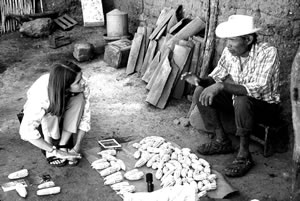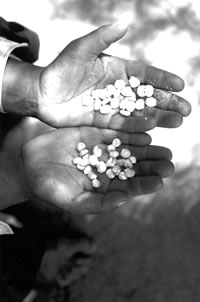|

Dialogue
Commentary
Commentary Policy- AN
Commentaries are designed to explore diverse views of the discipline
from an anthropological perspective. Commentaries reflect the views
of the authors; their publication does not signify endorsement by
AN or the AAA. Authors are expected to verify all factual
information included in the text.
Farmers' Rights and Genetically
Engineered Crop Varieties
DAVID A CLEVELAND
AND DANIELA SOLERI
UC SANTA BARBARA
A“maize scandal”
erupted in the fall of 2001, intensifying the global debate about
genetically engineered (GE) crops and focusing it on the biological
and social effects of GE on small-scale farmers in
traditionally-based agricultural systems, and the rights of those
farmers to control this new technology.
The cause of the scandal—a scientific report in the
journal Nature concluding that transgenes from GE maize varieties
had flowed into farmers’ traditional maize varieties in the
mountains of Oaxaca, Mexico, despite a ban on the planting of GE
maize in Mexico since 1998. These insect resistant GE varieties
contain a transgene from a bacterium that produces a protein toxic
to certain caterpillars that eat maize, and probably entered Mexico
as grain shipments from the US.
It has been stated by Melina Hernández Sosa, of an
indigenous farmers’ organization in the Sierra Juarez de Oaxaca,
that this transgene flow is a “crime against all the indigenous
peoples and farmers who have for millennia protected [maize], for
humanity to be able to enjoy.” On the other hand, proponents of GE
have stated that these transgenes are a “welcome” addition that
augments Third World farmer’s traditional crop varieties and
agriculture, which they get for free, as stated by the scientists
who signed a petition about the “Mexican maize scandal.” Such
dramatically contradictory viewpoints raise questions about the
rights of Third World farmers over their traditional varieties,
their agricultural systems, and their future, in the face of the
rapid molecular globalization of agriculture.
Molecular
Globalization
Dramatic advances in molecular biology and
biotechnology are helping to fuel a globalization of agriculture at
the molecular level, most visible in GE crop varieties created by
moving genes directly into plants, often from distantly related
organisms. In tandem with this process are increases in intellectual
property rights (IPRs) at the molecular level—formal legal rights to
plant genes and DNA segments, and to the technologies for
manipulating them.
The march of biological and IPR molecularization
presents dramatic new challenges and opportunities for the
livelihoods and rights of over one billion traditionally based,
small-scale farmers in the Third World. These farmers depend on
their traditional crop varieties, use limited production inputs,
have their own system of IPRs, and want to improve their lives and
provide a better future for their children. Unlike industrial world
IPRs, farmers’ traditional IPRs are diverse, including individual,
community and ethnic group rights. They also have no time limit, and
do not depend on expensive documentation by molecular biologists and
lawyers.
How will molecular globalization affect the
resources and rights of these farmers? How will farmers’ rights to
their traditional crop varieties, and to GE crops, be defined, and
by whom? How will new molecular technologies and IPRs affect
farmers’ ability to save their own seeds, and exchange seeds
locally? Can GE crops support traditional farmers’ own goals, or
will they inevitably move them further under the control of a global
agricultural system controlled by corporations? How can these
farmers have more control over decisions at the global level that
directly affect them?
Rights to Seeds
In the early
1980s some countries and farmer support groups sought to do away
with all IPRs in crops, establishing “farmers’ rights” to all crop
genetic resources, but this move was defeated by the US and other
industrial nations, and private rights in plants and other living
organisms now dominate, with industrial patents leading the way.
Farmers were left with having to defend themselves from the advances
of an IPR system in plants designed by industrial nations and
corporations, a system that does not recognize farmers’ traditions
or current needs.
The drive to globalize industrial world IPRs in
plants has been intensified due to the pressure from agbiotech
corporations. This means that as patented GE crops and their
transgenes move intentionally or unintentionally around the world,
so could the rights of the companies who own them. The World Trade
Organization seeks a worldwide uniformity of laws for IPRs in plants
and plant DNA to facilitate global enforcement. In the US patent
holders have rights to seek damages from farmers who end up with
patented genes in their crops, even though they don’t want them, and
didn’t know they were there. While most corporations deny they would
enforce their IPRs against Third World farmers, the global economic
system is moving in a direction that will make this possible, and
precedents have already been established. Control of local farmers’
crop genetic resources, and the traditional names and other cultural
property that go with them through industrial IPRs, can legally and
economically prevent local people themselves from reaping potential
benefits in a global marketplace increasingly interested in
traditional crops and foods.
There are already cases of this. For example,
patents have been issued to a US company for yellow beans that have
been grown and sold in Mexico for centuries. They were issued based
on claims of very minor genetic changes to the beans—in the
frequency of a particular shade of yellow; independent genetic
research, however, challenges the genetic and legal basis of the
claim. These patents now prevent sales of yellow beans, including
Mexican imports, in the US by anyone but the patent holder, unless
royalties are paid. A legal challenge has been mounted by the
Mexican government.
Rights to Agricultural
Systems
Seeds only have meaning as part of agricultural
systems, so we need to consider farmers’ rights to make a decent
living from farming, to choose the technologies they desire based on
full disclosure of long-term costs and benefits, and to maintain
their communities and cultures.
Wide-scale, unmonitored gene flow via seed and
pollen from modern crop varieties into traditional ones has been
going on at least since the green revolution introduced these
varieties in the Third World beginning in the 1960s; yet details of
the effects of this flow on farmers’ varieties and livelihoods are
largely unknown, though there is much circumstantial evidence for
negative as well as positive effects. With the advent of GE crops,
it is now possible to more easily and accurately track the flow of
genes, as with the case in Mexico. No one knows what the effects of
transgenes will be on traditional farming, but with the advent of GE
crops that produce pharmaceutical and industrial chemicals, the
potential risk is likely to be greater. Biological studies and the
Oaxacan example suggest that global or regional agreements are the
only way to ensure GE-free zones in areas of crop diversity or
origin where farmers’ do not want transgenes entering their
traditional crop varieties.
GE crops being promoted in the Third World today
are similar to conventional modern varieties, except that they have
transgenes for herbicide resistance or for insect resistance.
Proponents claim they will have positive effects in the Third World,
yet it is likely they will accelerate the negative as well as
positive effects of industrial agriculture and the green revolution,
including the potential for greater yield, as well as greater
dependence on global markets for seed and other inputs, and
increasing loss of control over local resources with the advance of
molecular IPRs and biotechnologies. However, GE could also be used
to create varieties that better serve farmers’ needs, for example by
transferring into traditional varieties genes for resistance to
drought or important diseases, but this is unlikely unless farmers
participate in decision making.
Rights to Participation
There
is increasing recognition in the industrial world of the necessity
for including the public in decisions about GE crops and foods. At
both the global and local levels, however, Third World farmers have
not been effectively involved. It is important to recognize that not
only are the IPRs of Third World farmers different than those of the
industrial world, but so is their agriculture; for instance, farmers
save much of the seed they plant and have little access to
agricultural support services. The trick is balancing requirements
for a context-specific approach based on farmers traditional IPRs,
and local conditions and needs, with those for access to global
resources and for the global regulation of biological and IPR
molecularization.
One important step is research to better understand
farmers’ options, and bring farmers’ voices into policy discussions,
to help farmers optimize benefits and minimize costs, in their own
terms. This includes interviewing farmers about their knowledge,
values and practices concerning GE maize and its possible effects on
their farming. Another important step is to retain independent
public research on GE crops and the needs of Third World farmers.
This is a challenge when many public institutions, like our own
university, are increasingly seeking links with private biotech
corporations that may compromise their ability to carry out research
in the global interest of Third World farmers and others.
 |
Discussion between Nicasio Hernandez Sanchez
and Daniela Soleri during an interview on traits in
traditional maize varieties, Oaxaca, Mexico. Photo by
D Cleveland, used with permission of subjects.
|
 |
Photo by Daniela Soleriy.
|
Cleveland and Soleri
have collaborated on research with farmers and plant breeders on the
similarities and differences in knowledge, practice and biological
outcomes. They have edited Farmers, Scientists and Plant
Breeding: Integrating Knowledge and Practice (2002). Their
current research includes working with colleagues in Cuba (Humberto
Ríos Labrada, INCA), Guatemala (Mario Fuentes, ICTA) and Mexico
(Flavio Aragón Cuevas, INIFAP), interviewing farmers about GE maize
(pewagbiotech.
org/events/0929/presentations/soleri.pdf).
|